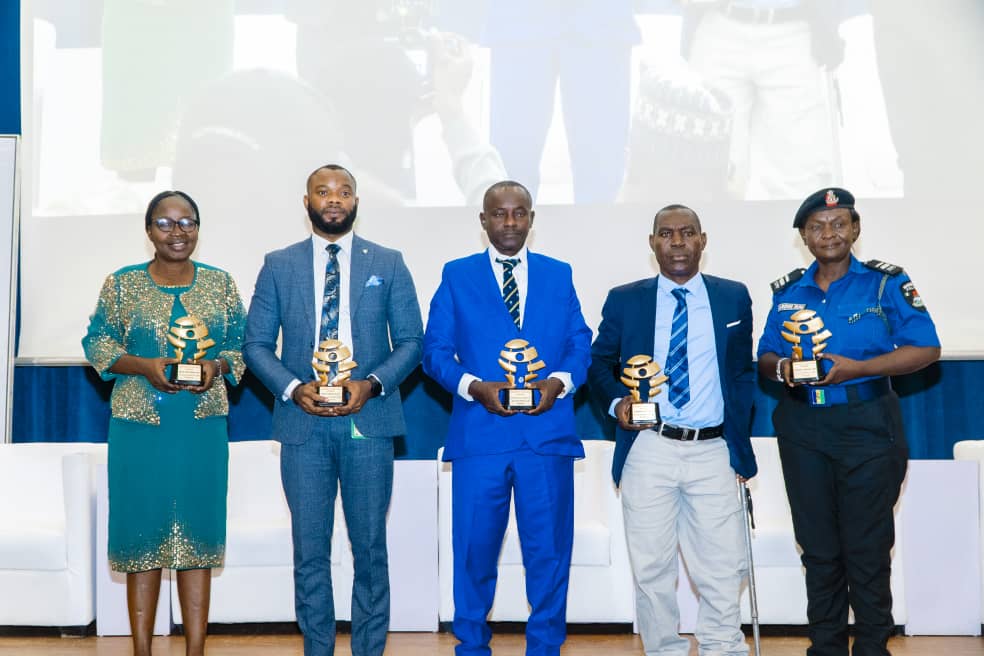
In its commitment to promote integrity, trust and positive behavioural change in the public service sector, Accountability Lab Nigeria on Thursday honoured five public servants working in different parts of the country with its 2024 Integrity Icons award.
The awardees were; Inspector Kamoshi Tada under the Fagge Police Station Kano State, Olugbenga Johnson Kuye an Auditor with the Lagos State Accident and Emergency Centre (LASAEC), Ezekiel Osemuahu a procurement officer with the Edo State Public Procurement Agency Edo State, Temitope Ojoge the Principal of Fiwasaye Girls Grammar School Ondo State, and Idowu Quadri a procurement officer with the Onigbongbo Local Council Development Agency (LCDA) Lagos State.
The Country Director Accountability Lab, Odeh Friday who spoke at the 8th edition of the Integrity Icon Summit organised in partnership with John D and Catherine T MacArthur Foundation, Luminate and Yar’Adua Foundation in Abuja, noted that the five awardees were selected from over 2,500 nominations submitted by Nigerians.
According to him, Accountability Lab remains committed to name and fame, celebrate and amplify the stories of public servants who embody the principles of honesty, accountability and responsible leadership in a nation bedevilled with pervasive corruption and persistent lack of accountability.
He said: “We are here today to celebrate amazing public servants who are doing the right thing, doing really exceptionally well, to ensure that they build trust within citizens and their government offices.Today the Integrity Icon names and fames them.
“Basically we’ve been doing this for over 8 years just to ensure that we build a network of integrity, of public servants doing the right thing, people who have the right behaviours, who have the right social norms to help us enhance the trust with public servants. We are celebrating them to see that we can continue to give hope to Nigerians, to ensure that people are still doing the right thing and people are still making governance work for citizens in government offices.”
Odeh further added, “When it comes to a couple of government offices, it’s not about bribes. Sometimes you manipulate data to ensure that you are telling the right story. But again, it doesn’t help planning as a country but we have people who ensure that the right things are being done from hospitals to schools.
“Even in procurement processes, we have people who ensure the cycle of procurement is being respected, that people have the information that a contract is happening in your community then they can also monitor and support to give you feedback. So it’s building that trust in government.
“So we ensure that the criteria are basically supported by citizens. So we don’t nominate these icons. The citizens nominate them and send them to us then we collate.
“Over this year, we’ve had over 2,500 nominations; then we review the nominations to ensure that the stories that have been told and the work that has been done on these criteria fits the context and what we can tell stories about.”
Founding Executive Director,
African Centre for Leadership, Strategy & Development (Centre LSD), Dr. Otive Igbuzor, regretted that a report indicating that only 43% of Nigerians expressed trust in their government, highlights a significant gap in public confidence in governance processes.
Speaking on the topic, “Building Trust in Governance Processes: The Power of Ethical Behaviours and Positive Norms,” Otive said, “In Nigeria, trust deficits have become a pervasive issue, fuelled by corruption, lack of transparency, poor service delivery, and a history of unfulfilled promises.
“The trust deficit has profound implications, from political instability and economic downturns to weakened social cohesion. For instance, Trust deficit can lead to protest and uprising as seen in Sudan (2019), Sri Lanka (2022) and #ENDSARS protest in Nigeria in 2020.”
Otive listed some practical steps that could build trust in Nigeria through ethics and norms to include: strengthening governance institutions to resist undue influence and enforce ethical standards, promoting inclusive governance processes to reflect the diverse needs of society, capacity building for ethical leadership, leveraging technology for accountability, recognizing and rewarding integrity
“Building trust in governance processes is both an urgent necessity and a collective responsibility. The persistent trust deficit, fuelled by corruption, lack of transparency, and weak institutional frameworks, demands deliberate and sustained actions from all stakeholders.
“Ethical behaviours and positive norms form the cornerstone of trustworthy governance, fostering transparency, accountability, and inclusivity.
“As we celebrate individuals who embody integrity at this summit, let their examples serve as a clarion call for all leaders and institutions to prioritize ethical conduct and adopt positive governance norms. Rebuilding trust in governance is not just about institutional reforms; it is about restoring hope and confidence in leadership and creating an environment where citizens feel represented and valued.”
Please follow and like us:


